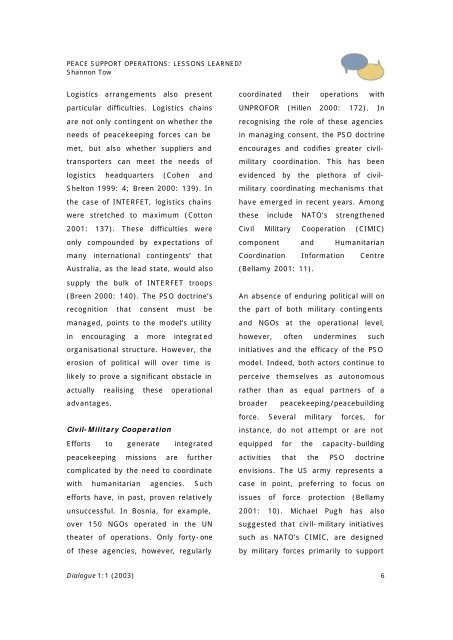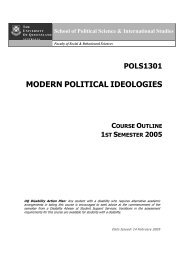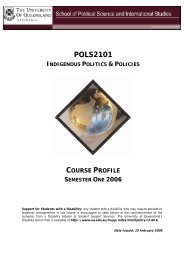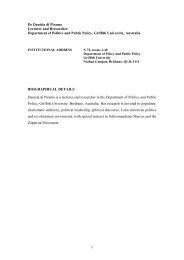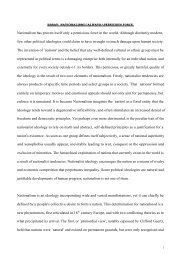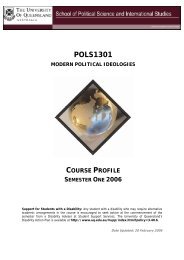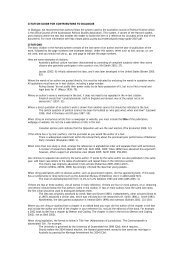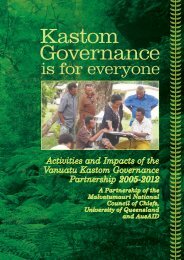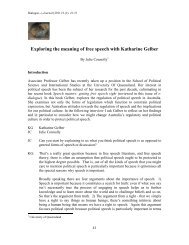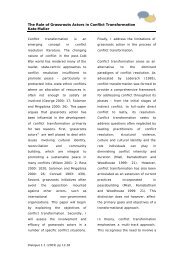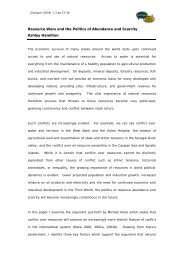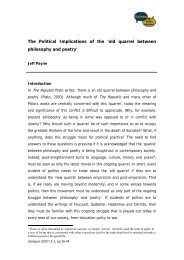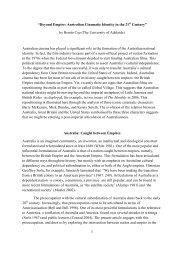Peace Support Operations: Lessons Learned? - School of Political ...
Peace Support Operations: Lessons Learned? - School of Political ...
Peace Support Operations: Lessons Learned? - School of Political ...
Create successful ePaper yourself
Turn your PDF publications into a flip-book with our unique Google optimized e-Paper software.
PEACE SUPPORT OPERATIONS: LESSONS LEARNED?<br />
Shannon Tow<br />
Logistics arrangements also present<br />
particular difficulties. Logistics chains<br />
are not only contingent on whether the<br />
needs <strong>of</strong> peacekeeping forces can be<br />
met, but also whether suppliers and<br />
transporters can meet the needs <strong>of</strong><br />
logistics headquarters (Cohen and<br />
Shelton 1999: 4; Breen 2000: 139). In<br />
the case <strong>of</strong> INTERFET, logistics chains<br />
were stretched to maximum (Cotton<br />
2001: 137). These difficulties were<br />
only compounded by expectations <strong>of</strong><br />
many international contingents’ that<br />
Australia, as the lead state, would also<br />
supply the bulk <strong>of</strong> INTERFET troops<br />
(Breen 2000: 140). The PSO doctrine’s<br />
recognition that consent must be<br />
managed, points to the model’s utility<br />
in encouraging a more integrated<br />
organisational structure. However, the<br />
erosion <strong>of</strong> political will over time is<br />
likely to prove a significant obstacle in<br />
actually realising these operational<br />
advantages.<br />
Civil-Military Cooperation<br />
Efforts to generate integrated<br />
peacekeeping missions are further<br />
complicated by the need to coordinate<br />
with humanitarian agencies. Such<br />
efforts have, in past, proven relatively<br />
unsuccessful. In Bosnia, for example,<br />
over 150 NGOs operated in the UN<br />
theater <strong>of</strong> operations. Only forty-one<br />
<strong>of</strong> these agencies, however, regularly<br />
coordinated their operations with<br />
UNPROFOR (Hillen 2000: 172). In<br />
recognising the role <strong>of</strong> these agencies<br />
in managing consent, the PSO doctrine<br />
encourages and codifies greater civilmilitary<br />
coordination. This has been<br />
evidenced by the plethora <strong>of</strong> civilmilitary<br />
coordinating mechanisms that<br />
have emerged in recent years. Among<br />
these include NATO’s strengthened<br />
Civil Military Cooperation (CIMIC)<br />
component and Humanitarian<br />
Coordination Information Centre<br />
(Bellamy 2001: 11).<br />
An absence <strong>of</strong> enduring political will on<br />
the part <strong>of</strong> both military contingents<br />
and NGOs at the operational level,<br />
however, <strong>of</strong>ten undermines such<br />
initiatives and the efficacy <strong>of</strong> the PSO<br />
model. Indeed, both actors continue to<br />
perceive themselves as autonomous<br />
rather than as equal partners <strong>of</strong> a<br />
broader peacekeeping/peacebuilding<br />
force. Several military forces, for<br />
instance, do not attempt or are not<br />
equipped for the capacity-building<br />
activities that the PSO doctrine<br />
envisions. The US army represents a<br />
case in point, preferring to focus on<br />
issues <strong>of</strong> force protection (Bellamy<br />
2001: 10). Michael Pugh has also<br />
suggested that civil-military initiatives<br />
such as NATO’s CIMIC, are designed<br />
by military forces primarily to support<br />
Dialogue 1:1 (2003) 6


